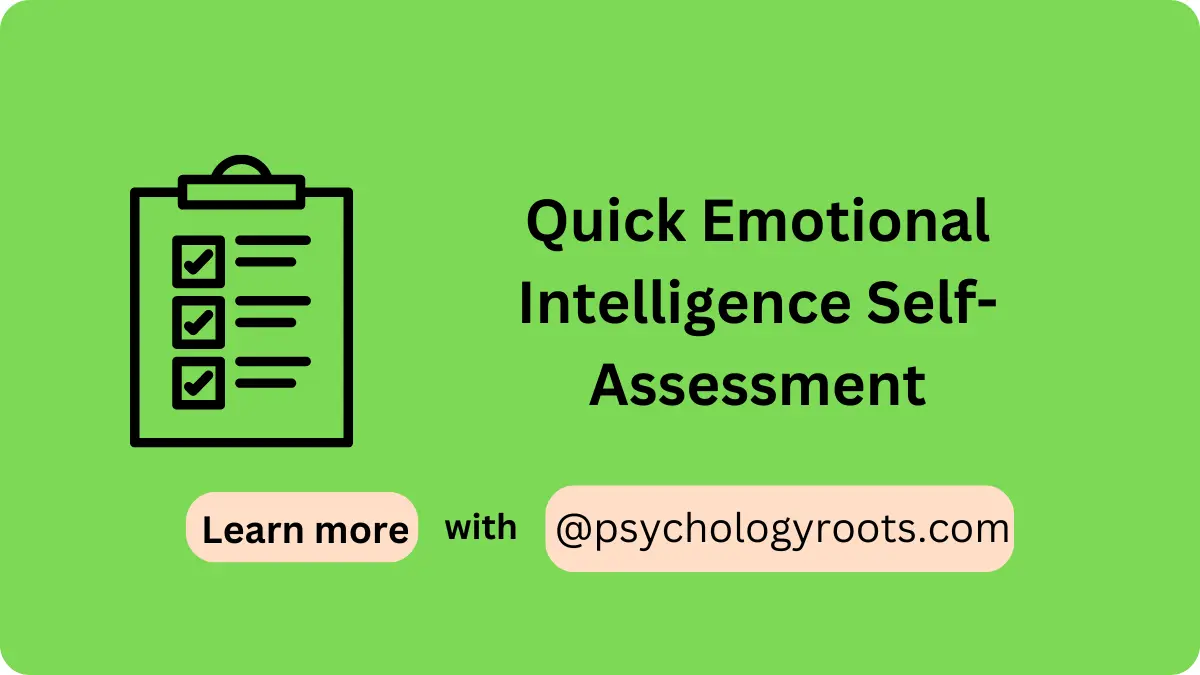Table of Contents
Quick Emotional Intelligence Self-Assessment
Here in this post, we are sharing the “Quick Emotional Intelligence Self-Assessment”. You can read psychometric and Author information. We have thousands of Scales and questionnaires in our collection (See Scales and Questionnaires). You can demand us any scale and questionnaires related to psychology through our community, and we will provide you with a short time. Keep visiting Psychology Roots.
About Quick Emotional Intelligence Self-Assessment
Scale Name
Quick Emotional Intelligence Self-Assessment
Author Details
Paul Mohapel (Adaptation for San Diego City College MESA Program)
Translation Availability
Not sure

Background/Description
The Quick Emotional Intelligence Self-Assessment is a brief tool designed to help individuals assess their emotional intelligence (EI) in a time-efficient manner. Based on the broader EI models, this self-assessment provides quick feedback on key components of emotional intelligence, including self-awareness, self-management, social awareness, and relationship management.
Originally adapted for the San Diego City College MESA Program from a model developed by Paul Mohapel, this tool enables users to quickly gauge their emotional strengths and areas for improvement, especially in academic and professional contexts. Emotional intelligence plays a crucial role in how people manage behavior, navigate social interactions, and make personal decisions that achieve positive results.
Administration, Scoring and Interpretation
- Target Population: This self-assessment is suitable for students, professionals, and anyone looking to better understand their emotional intelligence.
- Format: The assessment consists of self-report items where respondents evaluate their emotional capabilities across various domains, such as self-awareness and relationship management.
- Administration: It is a short, online or paper-based tool that typically takes 5-10 minutes to complete. Respondents rate themselves on a Likert scale ranging from strongly disagree to strongly agree.
- Scoring: The total score provides an overall indication of the individual’s emotional intelligence. Additionally, sub-scores may be given for different components like self-management and social awareness.
- Interpretation: Higher scores suggest stronger emotional intelligence in specific domains. The results can guide personal development efforts, especially for improving interpersonal relationships and self-regulation.
Reliability and Validity
Though this tool offers quick feedback, it is based on the validated and widely accepted emotional intelligence framework.
- Reliability: While the quick nature of the assessment limits the depth of insight, it still shows acceptable internal consistency for preliminary self-assessment.
- Validity: As an adaptation of Paul Mohapel’s model, the validity is drawn from the original theoretical framework of emotional intelligence, but further research is recommended for a more robust validation.
Available Versions
Multiple-Items
Reference
Sharif, R., Rana, M. B., & Akhter, I. Emotional Intelligence as a Predictor of Academic Performance: A Study on Final Year Students of Undergraduate Program.
Important Link
Scale File:
Frequently Asked Questions
Q: What does this self-assessment measure?
A: It measures emotional intelligence across self-awareness, self-management, social awareness, and relationship management.
Q: Who is this assessment for?
A: It is designed for students, professionals, and anyone interested in understanding their emotional intelligence.
Q: How long does it take to complete?
A: It typically takes about 5-10 minutes to complete.
Q: What do higher scores indicate?
A: Higher scores suggest stronger abilities in recognizing, managing, and using emotions effectively in personal and social situations.
Q: Is this assessment reliable and valid?
A: While it is a quick self-assessment, it is based on validated models of emotional intelligence. However, further in-depth tools are recommended for comprehensive assessment.
Disclaimer
Please note that Psychology Roots does not have the right to grant permission for the use of any psychological scales or assessments listed on its website. To use any scale or assessment, you must obtain permission directly from the author or translator of the tool. Psychology Roots provides information about various tools and their administration procedures, but it is your responsibility to obtain proper permissions before using any scale or assessment. If you need further information about an author’s contact details, please submit a query to the Psychology Roots team.
Help Us Improve This Article
Have you discovered an inaccuracy? We put out great effort to give accurate and scientifically trustworthy information to our readers. Please notify us if you discover any typographical or grammatical errors.
Make a comment. We acknowledge and appreciate your efforts.
Share With Us
If you have any scale or any material related to psychology kindly share it with us at psychologyroots@gmail.com. We help others on behalf of you.